Best Fertilizer For Marigold Plant – Homemade & Others
Marigolds prefer a plant food rich in phosphorus to promote more flowers. You can also use a balanced fertilizer for overall good growth
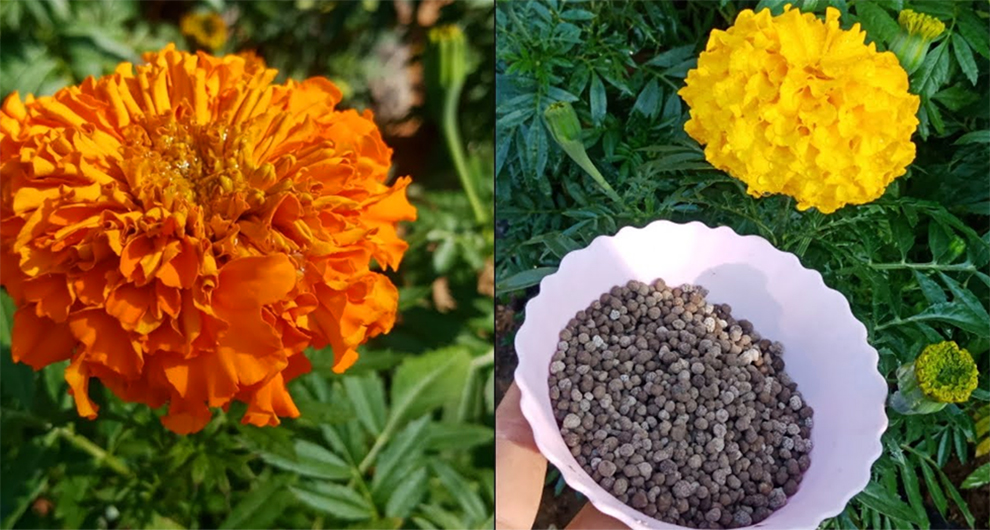
Picking the right fertilizer is imperative for promoting abundant blooms, healthy growth, and solid plants in marigold flowers. The best fertilizer for marigold plants shall offer all vital nutrients like nitrogen, phosphorus, and potassium.
These are crucial for plant growth and development. The dearth of these nutrients necessary for plant growth and development can result in stunted growth, poor flowering, and weakened plants susceptible to pests and diseases.
Hence, picking the correct fertilizer is crucial, as marigold flowers have specific nutrient requirements.
You can either use a balanced fertilizer for your marigold that has a somewhat uniform NPK ratio targeting all three areas – flower, leaf, and root development. Or, Marigold being a flowering plant, you can use a fertilizer rich in phosphorus, which promotes more blooms.
One of the best plant food for marigolds is Jack’s Classic. It has an NPK of 10-30-20. Rich in phosphorus, this plant food promotes abundant blooms.
- Granular Feed for Geraniums – Age Old Bloom Natural – Best Liquid Fertilizer For Marigolds
- Jacks Classic – Overall Best
- Scotts Water Soluble Super Bloom – Ideal For More Blooms
Marigold Fertilizer Requirements
Marigolds have a moderate fertilizer requirement, but they benefit from a balanced or phosphorus-rich food with NPK 15-15-15, 5-10-5, or similar ratio.
A balanced feed for marigolds is best for their all-round growth and development. It is vital to avoid ammonium fertilizers when the soil temperature drops below 19°C. Water-soluble fertilizers like poly-feed (19:19:19), potassium nitrate (13:0:45), and urea can also be used for Marigolds.
The Best Fertilizer For Marigolds
Typically, a fertilizer with high phosphorous content, such as a 5-10-5 NPK ratio, is the best for promoting flower production in marigold varieties.
Some of the fertilizer options suitable for marigold plants are listed below.
1. Jacks Classic 51024 J R Peters Inc No.1.5
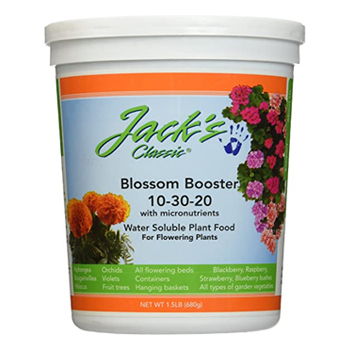 |
Check price on Amazon |
Do you need a fertilizer that gives your marigold optimal nutrition and does not burn the plant? If yes, this fertilizer from Jacks Classic is an excellent option.
Its micronutrient formulation helps promote strong roots and green foliage and healthy flowers.
With an NPK ratio of 10-30-20, this fertilizer is adept at generating a profusion of blooms and enhancing the vibrancy of colors on plants both indoors and outdoors. It works exceptionally well for flowering varieties such as marigolds, begonias, and geraniums.
What makes this the best fertilizer for marigold plants is its high safety factor. It comes with a measuring spoon to prevent accidental over-feeding, which may harm your plants. Further, you can use it for fruits and vegetables and even as a transplant solution.
2.Smart Release Osmocote Plant Food for Indoor and Outdoor
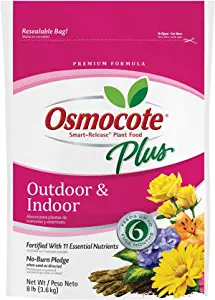 |
Check price on Amazon |
Osmocote is a slow-release granular fertilizer. It is ideal for promoting healthy growth and blooms in marigold plants. Every homogenous granule in this plant food has a balanced NPK ratio of 15-9-12.
In addition, it also includes micro and secondary nutrients that wonderfully feed the plants for up to six months. The nutrients are released gradually, depending on the soil temperature. It ensures that they nourish the plants for up to six months.
Osmocote releases nutrients depending on the soil temperature, ensuring they are consumed by the plants at the right time.
Fortunately, it is a very easy-to-use marigold plant food, as it comes with an applicator, and you can sprinkle on the soil surface or mix it into the top 1-3 inches of the soil.
What’s more? It is a mistake-proof fertilizer that does not burn plants, even if over-applied. Overall, Osmocote guarantees performance, and if you are unhappy, you can return the empty package to The Scotts Company for a full refund.
3.Miracle-Gro 1001921 Water Soluble Flower Food, 1.5 lb
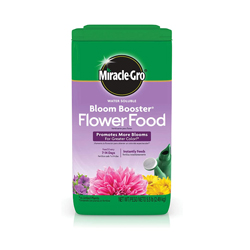 |
Check price on Amazon |
Miracle-Gro is a water-soluble bloom booster. It is one of the most recommended fertilizer types with an NPK ratio of 18-18-21. The plant food is exquisitely formulated to promote healthy roots and more colorful and better blooms in perennial and annual flowers.
This fertilizer for marigold plants is easy to use. You can apply it every week without inflicting any damage on your plants.
It is an affordable pick. You can use it with Garden Feeder or any watering can. To use the feeder, follow the steps:
- Fill the jar with the fertilizer
- Attach the feeder to a garden hose
- Choose your desired spray pattern by turning the yellow spray head.
For the watering can, follow the steps:
- Mix one tbsp of fertilizer for every gallon of water for outdoor plants or half tsp per gallon for indoor plants.
- Fill the watering can.
- Soak the base of the plants for the best results.
Remember to follow the label instructions for proper usage.
4. Age Old Bloom Natural
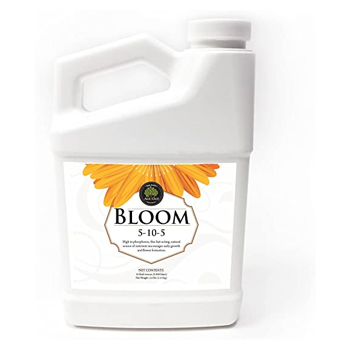 |
Check price on Amazon |
It is a liquid fertilizer for marigolds available in different quantities, from 1 gallon to 32 ounces. The plant food is designed for use in hydroponics and organic gardening.
It has a 5-10-5 NPK, which encourages early flower formation and increases root mass thanks to its fast-acting phosphorus. Further, it is concentrated and odorless, making it easy to use sans any unpleasant smell.
5. Scotts Water Soluble Super Bloom Fertilizer
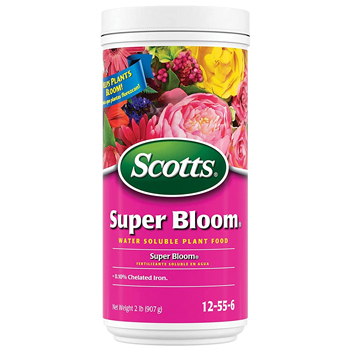 |
Check price on Amazon |
Scotts Super Bloom fertilizer has a 12-55-6 NPK. Naturally, it contains a high phosphorous level, which makes it beneficial for promoting plant blooms.
It is a fast-acting fertilizer that does not damage your plants, provided you use it as directed. The feed is ideal for outdoor flowers, fruiting plants, containers, and flower beds. You can apply it every 1-2 weeks to achieve best results.
Follow the steps for using this plant food:
- Dissolve two teaspoons of the fertilizer in one gallon of water
- Apply the solution to the soil at the base of your plants.
6. Total Advantage Dr. Earth Fertilizer
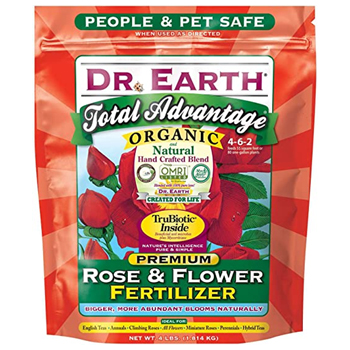 |
Check price on Amazon |
Dr. Earth is the organic, granular, and fertilizer for marigolds that stands out from the rest because of its commitment to providing organic and sustainable products for gardeners.
This marigold plant food is the sole option in the U.S.A. that has been verified by the Non-GMO Project, guaranteeing that it does not contain any synthetic chemicals, chicken manure contaminated with GMOs, or other harmful components. It has a 4-6-2 NPK.
The brand’s commitment lies in utilizing solely feed-grade and human-grade ingredients that are fortified with a diverse range of nutrients such as carbohydrates, multi-minerals, trace elements, humic acids, and proteins.
These elements work together to foster fertile soil, resulting in the growth of exquisite flowers in your garden. Dr. Earth’s fertilizer is certified by reputable organizations like OMRI, OIM, CCOF, NOP, and Non-GMO Project Verified, assuring users of the highest purity and transparency level.
Related: How to plant marigold seeds?
Is Manure For The Marigold Plant Good?
Yes, manure is a good source of nutrition for marigold plants. It is rich in nitrogen, phosphorous, and potassium, which helps with plant growth. But use manure that has been aged and composted, as fresh manure tends to burn the plant roots and release harmful pathogens.
Further, use manure in moderation, as excessive manure use can lead to an imbalance in the soil’s nutrient levels and issues for the plants. You can find many other better plant food options that meet the marigold plant’s needs.
What Is The Best Homemade Fertilizer For Marigolds?
Homemade fertilizers can be an excellent way to care for your marigolds and provide them with good nutrition. Some of the best homemade fertilizers include:
1. Compost
It is a natural fertilizer for marigolds that enriches the soil with organic matter and improves the soil structure, nutrient availability, and water-holding capacity.
When compost decomposes, it releases vital nutrients, such as nitrogen, phosphorus, and potassium. Marigolds need them to grow healthy and yield vibrant blooms.
Compost also helps promote beneficial organisms and earthworms in the soil, which improves overall soil health. Further, since it employs food scraps and other organic waste, it is an environmentally friendly option.
2. Worm Castings
They can also be an excellent organic fertilizer as worm casting have high levels of vital nutrients that are released slowly and consistently.
Worm castings improve soil health, promote root growth, and increase microbial activity. Further, they have beneficial microorganisms that suppress plant diseases and better plant vigor and growth.
3. Banana Peels
Banana peels can be an excellent homemade fertilizer for marigolds. They are a good potassium source and have other minerals vital for soil health. Banana peels encourage plant growth.
To use banana peels, chop them into small pieces and bury them in the soil around the marigold plant. Alternatively, you can make tea by soaking these peels in water for some days and then using the liquid to water the plants.
But do not use banana peels as the sole source of fertilizer for marigolds.
4. Epsom Salt
It is a popular household item that can be used as a marigold plant fertilizer. Epsom salt is a rich source of sulfur and magnesium, two vital nutrients for healthy growth and development in plants.
Magnesium helps with chlorophyll formation and supports plant growth, whereas sulfur is essential for protein production.
5. Diluted coffee grounds
They are another household item that can be used as a fertilizer for marigold plants. Coffee grounds contain nitrogen, phosphorus, and potassium, essential nutrients like magnesium necessary for plant growth and development.
Why Do Marigolds Need Fertilizer?
Fertilizing marigolds is imperative for their overall health and growth. Marigolds need a balanced supply of nutrients, including nitrogen, phosphorous, ad potassium. This help develops vibrant blooms, lush foliage, and strong roots.
Without plant food, marigolds grow slowly, produce fewer flowers, and are more susceptible to diseases and pests.
When Should I Fertilize Marigolds?
You must feed marigolds when the soil is of poor quality or lacks vital nutrients severely typically at the time of spring after the last frost date when the soil warms. Use a slow-release plant food at the planting time to better the conditions as the plant matures.
How Often Should I Fertilize My Marigolds?
Marigolds do not need frequent feeding. Hence, if the soil has been enriched with slow-release fertilizer and organic compost at planting time, they will not need more fertilizer for the season.
But if your marigolds are not performing well, apply a dose of granular fertilizer just before or instantly after flowering starts. It is crucial to refrain from excessive fertilization since it can result in an abundance of foliage growth, causing a decline in flower production.
Choosing The Best Fertilizer For Marigolds
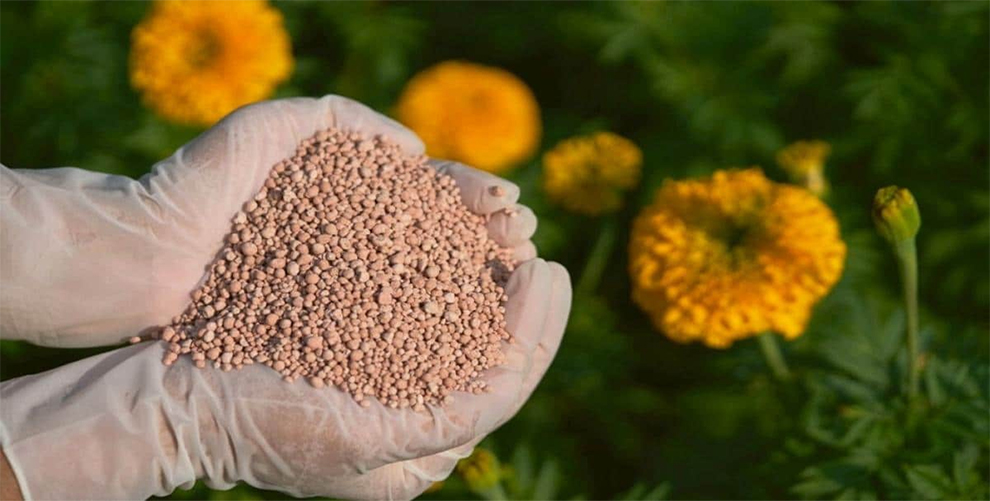
Here are the tips for selecting the marigold fertilizer:
1. Consider the specific needs of your marigold plants: Different marigold varieties have varying nutrient requirements. Thus, you must know what type of marigold you have and what nutrients it needs to thrive and then choose the correct fertilizer.
2. Evaluate the soil composition and pH levels: Marigolds thrive in well-draining soil having a pH between 6.0 and 7.0. Test the soil to assess if you need to add amendments or adjust the pH level before fertilizing.
3. Look for balanced NPK ratios and micronutrients: Marigolds seek a balanced fertilizer that contains nitrogen, phosphorus, and potassium (NPK). In addition, they need micronutrients like calcium, magnesium, and iron.
4. Consider slow-release formulations, organic vs. inorganic, and granular vs. liquid fertilizers: Slow-release fertilizers can provide a steady supply of nutrients over an extended period of time, while organic fertilizers can improve soil health and support beneficial microorganisms.
Granular and liquid fertilizers are both effective. However, liquid fertilizers absorb fast by the plant roots. Choose the type of fertilizer that best suits your needs and growing conditions.
